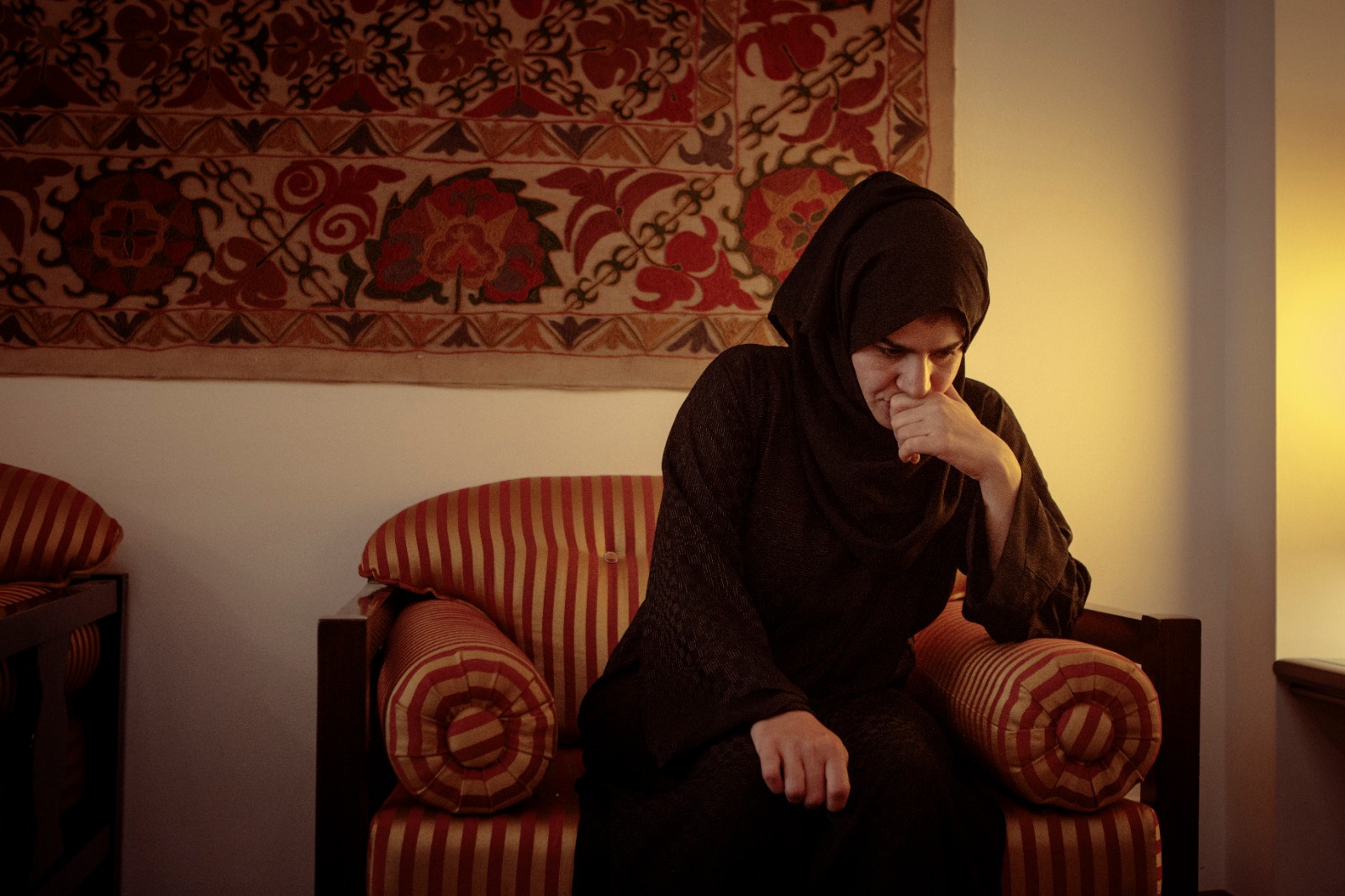Fired from their jobs, their bank accounts frozen, facing death threats, the country’s 270 female judges are in exile or in hiding.
Only six months ago Tayeba Parsa, 34, a female judge in Afghanistan, was determined to keep advancing women’s rights despite threats that Kabul would soon fall to the Taliban.
“There were times when I was really scared, but I always went to work,” Parsa tells me by phone from Warsaw. She has been living there with her elderly father and husband since last August, when the Taliban took over Kabul, waiting for news of a student visa from a country willing to take her in. “It was my profession, I loved my job, I studied for years to become a judge. I didn’t want to give it up.”
In the six months since the Taliban took over, the rights of women in Afghanistan have been all but eliminated. Girls older than 12 have few opportunities to obtain an education, while women fighting to hold on to any progress made over the last two decades face threats, prison, and often death. In this reality, women who not only have a higher education than most, but also practiced law in a position of authority over men, run the risk of execution without trial. In January 2021, unknown assailants on a motorcycle gunned down two Afghan women judges who were on their way to work.
When Parsa fled Afghanistan she gave up not only her career, but her entire life as she knew it.
“I was at home for three days when we heard news that the Taliban were at all checkpoints,” she says. “I collected all my documents and started destroying case notes to hide my identity.”
A former judge in the commercial division of the appeals court of Kabul province, Parsa is a member of the International Association of Women Judges (IAWJ) and volunteered to act as communications officer for the local branch. This association automatically placed her at higher risk.
“The Taliban consider every Afghan who collaborates with foreigners an infidel, a traitor,” she says. “When I was a judge, I was receiving constant anonymous death threats.” To avoid being targeted by the Taliban, Parsa and her fellow judges hid their identities when going to work and avoided riding in officially marked cars. She says she knew the dangers and accepted them.
“You never knew if you were going to come home,” she said.
In Taliban-controlled Afghanistan, all women and girls are at risk. But no one is more in danger than women lawyers, judges, journalists, and police officers. Women in key positions of power were especially targeted by this regressive militant group, which seeks to enforce an extremist interpretation of Islam. As soon as the Taliban took over, the women lost their jobs and saw their bank accounts frozen. They knew their lives were in imminent danger.
Afghan women judges were instrumental in challenging their deeply patriarchal society by demonstrating that violence against women and girls is not only wrong, but a punishable criminal offence. Putting aside fears for their own safety, they convicted and sentenced the men who stood trial in their courtrooms for rape, kidnapping, murder, forced marriage, or preventing women from going to school.
The new Taliban government has released criminals whom Parsa, and approximately 270 other female judges, had sentenced to prison after they were convicted of crimes. With these men now free to take revenge, the women were in grave danger.
Nabila, who requested that her last name be withheld, was a family court judge who granted divorce petitions to many women.
“Afghan law stipulates that a wife can request a divorce if her husband has been jailed for more than five years,” she tells me. “Some of these men were dangerous criminals who had committed serious crimes like murder and kidnapping. I granted these divorces according to the rule of law, but when the Taliban arrived, they released many of these criminals who came looking for me. I was no longer safe.”
Nabila is one of 26 female Afghan judges and lawyers who, along with their families, arrived in Athens from Afghanistan via Georgia this past September. While she, her husband, and their three children were eligible for evacuation, their immediate families remain behind. They fear reprisals against them and worry about their day-to-day living conditions, with a worsening humanitarian crisis on the ground.
“We’re always calling them, always checking up on them,” she said, adding that her relatives have had to change homes frequently for their safety.
International sisterhood
The International Association of Women Judges, which represents more than 6,500 judges in over 100 countries, has been instrumental in helping their Afghan colleagues get out of the country and in amplifying their message.
Mona Lynch, a Supreme Court judge in Nova Scotia and regional director of the International Association of Women, emphasized the urgency of getting those women out of Afghanistan.
“We have been trying to assist them in any way we can over the past few months,” she says. “These brave women have contributed for 20 years to maintaining the rule of law and stable governance in Afghanistan.”
“None of them wanted to leave their country, they simply had no choice,” said Judge Lynch. “And the ones still left behind are getting more and more desperate as the circumstances deteriorate. They need help and we need to be their voice.”
Education is everything
While waiting in Poland, Parsa has been using her free time to improve her English. After applying for scholarships at German, French, and American universities she obtained a visa for the UK, which she accepted—but at a cost.
“I’m happy because it’s an English-speaking country, and I can’t imagine the additional hurdle of learning another language right now, but the visas are only for me and my husband. I would have to leave my father behind. I don’t know what to do.”
She hopes to return to Afghanistan one day and help rebuild the country, but right now it’s only a vague dream, fueled by cautious optimism.
“The situation as it is right now won’t stand,” she says. “It’s intolerable, there’s no rule of law. Trials are being conducted by illiterate people. I want to be the voice of all Afghan women judges, those who are still there, still in hiding, still in danger, and those who have been evacuated but haven’t been offered visas,” she said, making a plea for the international community to help extricate the women still in hiding in Afghanistan, and to help settle permanently the women who got out but are still waiting for visas.
Nabila’s husband Asadullah, who is a construction engineer, has been translating parts of the conversation in his fluent English. In answer to the interviewer’s question, he described Afghanistan’s immediate future as “dark,” adding that this was the case “especially for women.”
“I believe in women’s rights, they’re half of society,” he says. “I have three daughters and I saw a dark future for them there. My girls would not have been able to attend school. The Taliban may have promised that they can go, but I don’t believe them.”
Life in Limbo in Athens
Some 200 female Afghan judges, Nabila among them, are hoping Canada will fast-track their arrival, since they qualify under a resettlement program for Afghan refugees in danger for having held leadership or human-rights positions.
Greece has welcomed more women fleeing Afghanistan than any other country so far. Amed Khan, an American philanthropist who was instrumental in helping many Afghan judges find a temporary home in Greece, said in an article for The Greek Reporter that it reflected an openness he saw from smaller governments that was missing from the world’s biggest economic powers.
“The only political leadership I’ve seen is from smaller countries like Greece, Albania, Qatar, North Macedonia; it’s not the G7,” said Khan. “A lot of countries made a lot of money in Afghanistan and now they want to wash their hands and look for the next opportunity.”
Despite her gratitude, Nabila wants to put down permanent roots and is waiting eagerly for news of permanent resettlement. She is worried about the children being unable to attend school in Greece, because they are in the country on temporary visas.
A painfully slow process
Few countries have provided easy pathways for these women. They are scattered with their families in more than 17 countries around the world, and only a small number have been resettled permanently in their final destinations.
The American Bar Association has created the Afghanistan Response Project and the International Association of Women Judges has launched a fundraising campaign, but these efforts rely more on individual goodwill than government assistance.
The Canadian government has expanded its special immigration program to include women leaders and human rights defenders, as well as persecuted minorities, but advocates say the process is too slow. Immigration Minister Sean Fraser recently suggested that it could take up to two years for the government to meet its promise of resettling 40,000 Afghan refugees. Fewer than 7,000 have arrived in Canada so far.
And so these women wait, stuck in limbo. They can’t dream or plant roots in a temporary home. They worry about their future.
“These are professional, talented, brave women,” Parsa tells me. “They fought for the rule of law in Afghanistan. They stood strong against threats and political pressure. They’re educated and driven, they deserve to be offered scholarships and a new life, they are the future of Afghanistan.”



